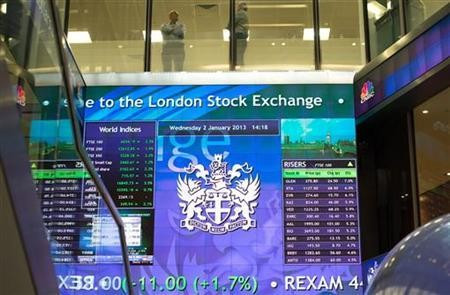Dow Passes 14,000, European Stocks Gain as Manufacturing Data Points to Global Recovery

The Dow Jones Industrial Average closed above 14,000 for the first time in six years after a series of positive figures from the global manufactuing sector and better than expected employment data lifted benchmark indices around the world.
The Dow ended the session with a 1.1 percent gain, taking the benchmark average to 14,008.72 and the highest finish since October 2007. The broader S&P 500 notched its fifth consecutive weekly gain and ended the day 1.1 percent higher at 1,513.05.
The gains capped one of the best s on record for Wall Street and one of the best starts to the year for wide equities. The S&P 500's 5.2 percent gain last month, including dividend payments, was the strongest January performance since at least 1997. Globally, stock portfolios added around $2.6tn in value last month.
European markets closed out the week on a bullish note as investors bet that better manufacturing data from China and the United States - along with continued central bank support - will boost shares in the months ahead.
Britain's FTSE 100 gained 70.36 points, or 1.12 percent, to close at 6,347.24 points, the highest end-day level since 4 January 2008.Germany's DAX performance index rose 57.34 points to end the session at 7,833.39. The region-wide FTSE Eurofirst 300 added 3.55 points, or 0.3 percent, to close at 1,168.08.
Official manufacturing data from China earlier Friday suggested a suggest the world's fastest growing economy was showing signs of a progressive recovery while private data from HSBC indicated factory activity at a two-year high.
In Europe, final readings of January data showed modest improvement on the month but suggested the sharp pace of contraction which hammered growth in the third and fourth quarter of last year was beginning to subside.
Investors were also buoyed by data suggesting Europe's unemployment rate - sitting at a record high 11.7 percent - may be ready to fall. The first reading of January inflation around the region was also a surprise, showing prices rose at a 2 percent annual clip, a sharp slowdown from the 2.2 percent pace in December and right around the European Central Bank's preferred target. Easing inflation offers the chance for the ECB to potentially lower its key refinancing rate next week.
In Britain, Purchasing Manager's Index data from Markit Economic showed consistent, if not robust, expansion on the month despite severe weather disruptions from the nation's worst snowstorm in many years.
US manufacturing also improved in January, with the benchmark index of activity rising to a near three-year high of 55.8 according to the first estimate from Markit.
The data built on a stronger-than-expected reading of the nation's job market, where employers added 157,000 new jobs last month, according to US Labor Department figures.
The headline unemployment rate rose one tenth of one percent to 7.8 percent, and the non-farm payroll figure was slightly shy of estimates, but revisions to December and November figures added a further 147,000 to US payrolls over the two month period.
Nonetheless, the headline jobless rate seems to suggest that investors won't bet against the Federal Reserve slowing the pace of its $85bn in monthly bond purchases - the third leg of its so-called quantitative easing strategy - or raise interest rates from the current record low until at least the first quarter of next year.
© Copyright IBTimes 2025. All rights reserved.





















